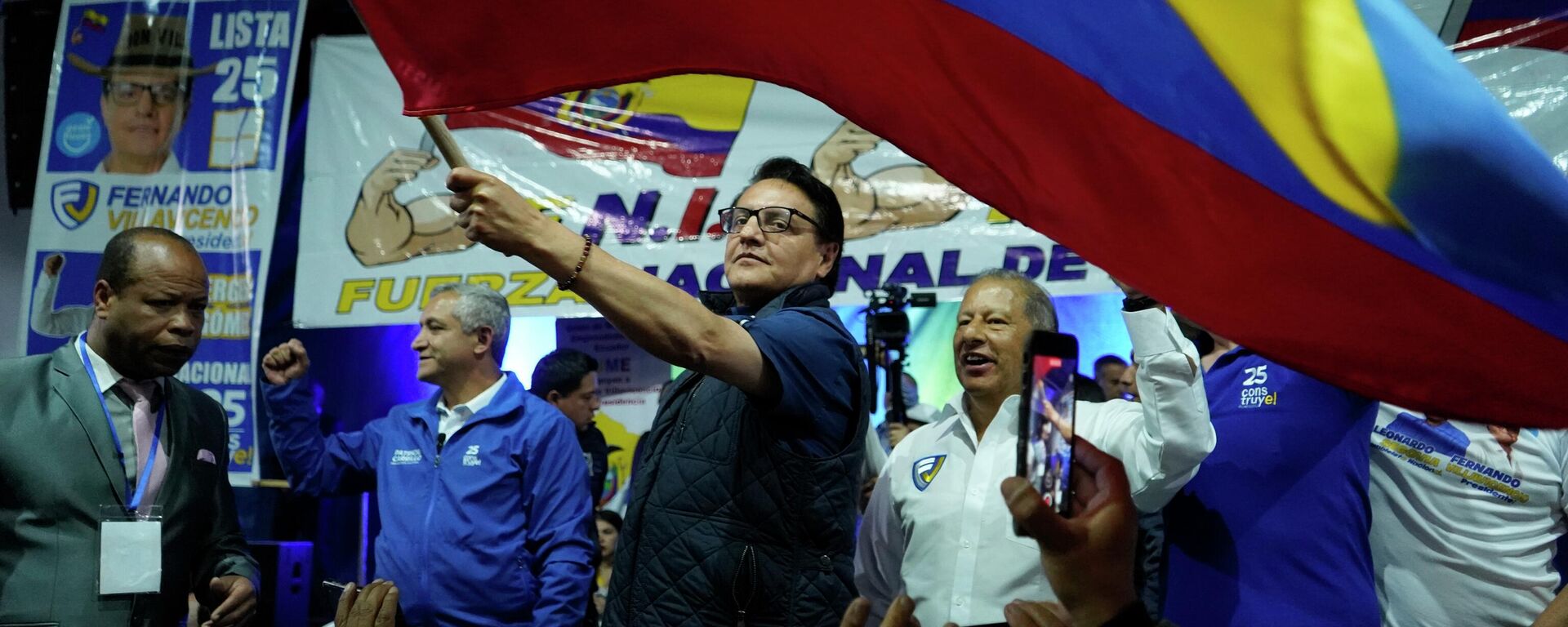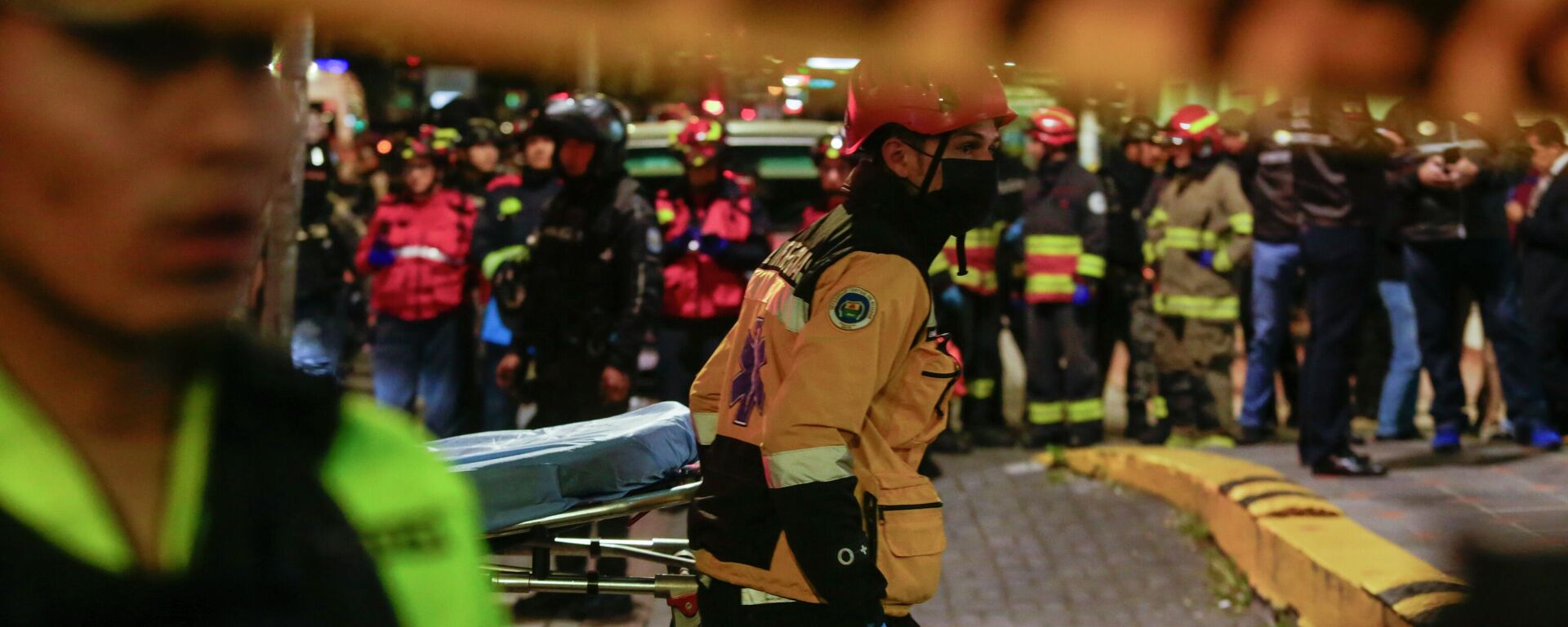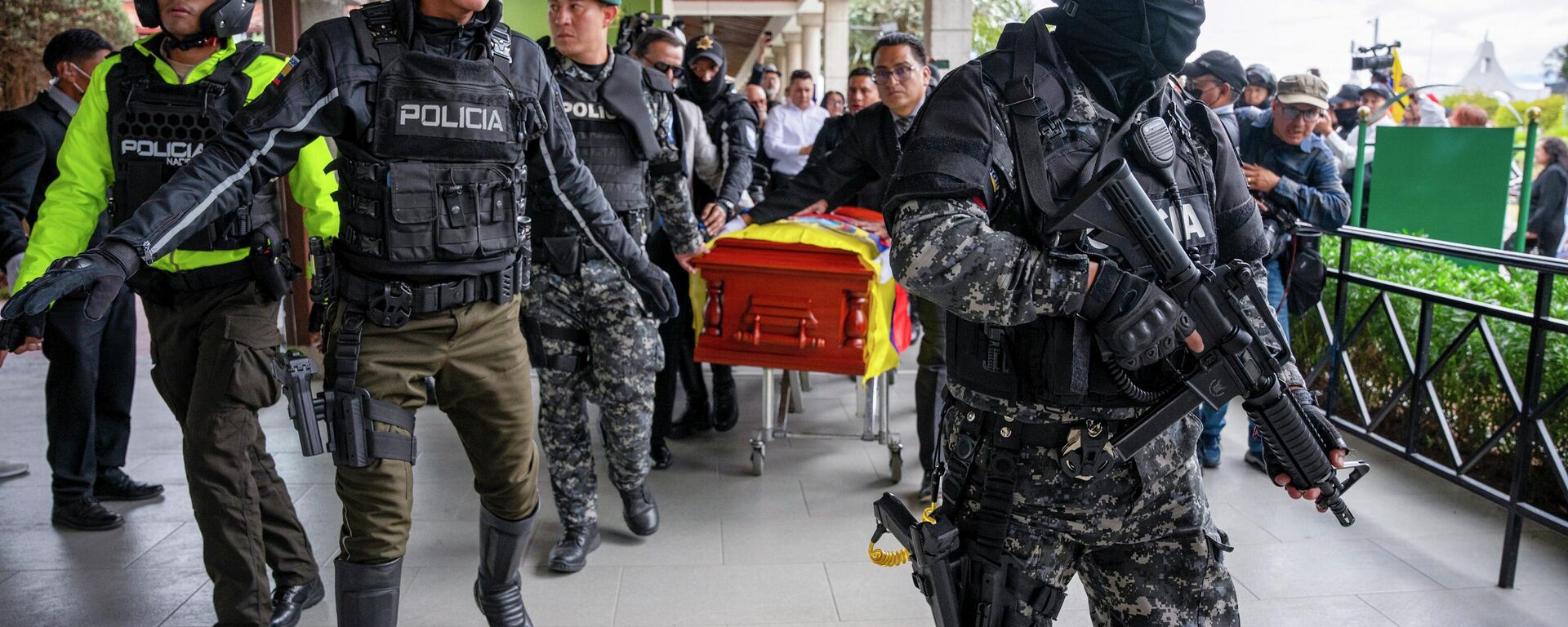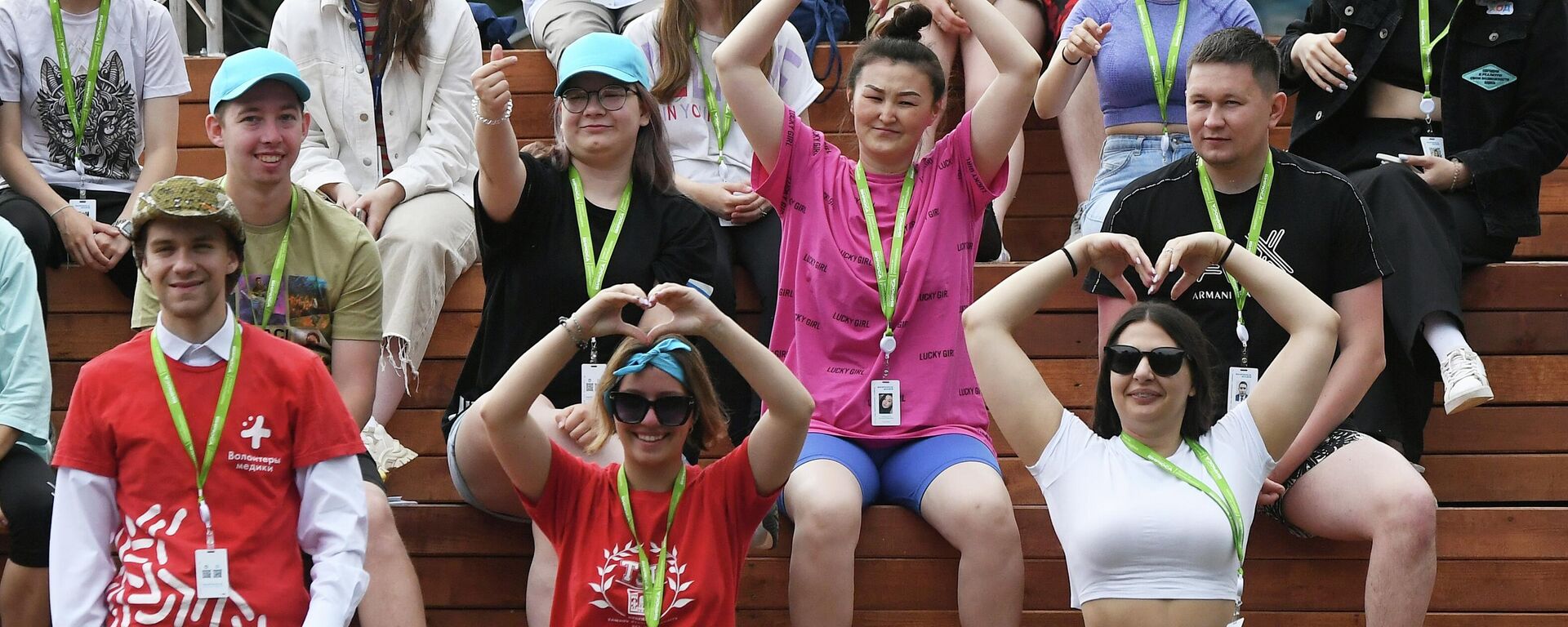Political Assassination in Ecuador Demonstrates Growing Clout of Drug Trafficking Gangs
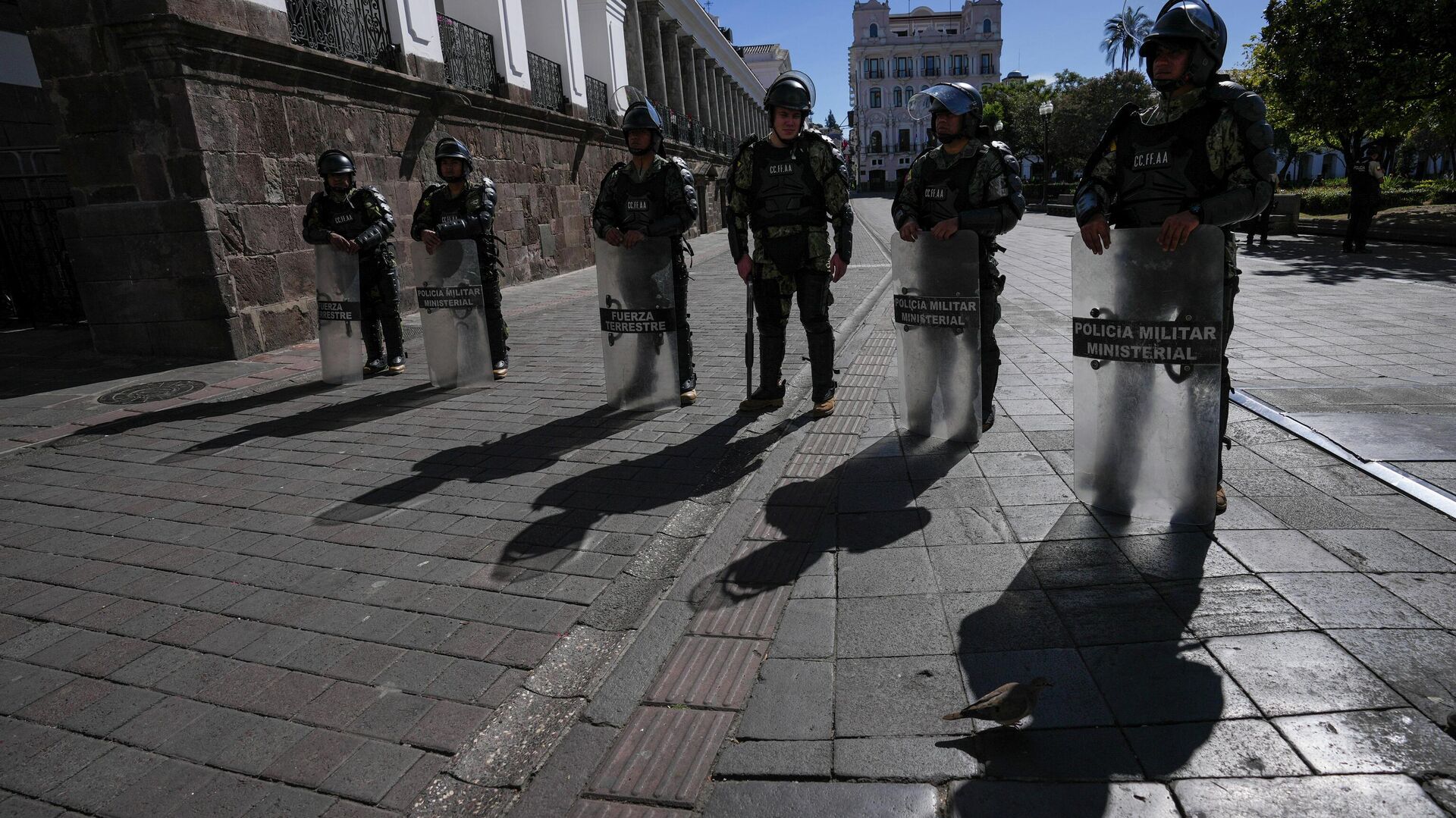
© AP Photo / Dolores Ochoa
Subscribe
MOSCOW (Sputnik), Tommy Yang - Against the backdrop of the shocking assassination of a presidential candidate in Ecuador, local activists explained to Sputnik that rising violence in the country results from the nation turning into a drug trafficking hub in South America.
Ahead of the presidential election in Ecuador last Sunday, Fernando Villavicencio, a presidential candidate who was an investigative journalist before joining politics, was gunned down while leaving a campaign rally on August 9.
Overshadowed by the tragic death of the rising political star, the election failed to produce a clear winner as the two top candidates headed to a run-off in October, with Christian Zurita, who replaced the killed Villavicencio, finishing third in the voting.
Although the Ecuadorian authorities arrested six Colombian nationals as suspects in the assassination, it is a much more daunting task for them to identify whoever ordered the hit.
Show of Force
Meanwhile, activists advocating on various social issues in Ecuador regard the brutal murder of someone who aspired to become president as a show of force by the drug trafficking gangs that have plagued the South American country.
"It's a kind of public demonstration of power. It's a message saying: 'You cannot control us, even the police. You cannot defend yourself. You must do what we want you to do.' That's the message," Carlos Larrea, a social science professor, told Sputnik.
From Larrea's perspective, the assassination of the presidential candidate is part of the rising violence ordinary Ecuadorians have been facing after the country became a transportation hub for the notorious drug trade in South America, with a fivefold increase in the homicide rate recorded since 2018.
"The assassination of Villavicencio was not, unfortunately, an isolated incident. The country had used to be one of the most peaceful countries in South America. However, the problem arose when the cocaine production in Colombia and Peru almost doubled in recent years. Ecuador became not a place of cocaine cultivation, but a hub of trafficking," he said.
Gangs operating in two of the most important countries for cocaine production in the world — Colombia and Peru — transferred the drugs to neighboring Ecuador, from where they were exported further to North America or Europe, Larrea explained.
"Ecuador is a very small country ... As a small country with a weak state, it has become a good opportunity for the gangs to try to avoid interception of the cocaine that was usually hidden in shipping containers. Given the lack of the capacity to intercept them, they expanded very quickly. Now, it's very difficult to control them," he said.
As the drug trade flourished in Ecuador, the gangs involved in the illicit operations began to terrorize the local population and crime rates in the country skyrocketed, the professor noted.
"There're a lot of people who are dying in the streets and they have nothing to do with the drug cartels. The country is becoming very dangerous and people are afraid to go into the streets, particularly in the coastal regions where the drug trafficking takes place. The cities are becoming insecure and most people are panicking. People don't want to go to a restaurant because they're afraid of being shot," Larrea said.
Although he lives in the capital city of Quito, Larrea has had to take precautions as well. "I used to go to a restaurant at least twice a month at night. Now, at six o'clock in the afternoon, I go to bed," he said.
Vulnerable Youth
Unfortunately, local residents in port cities such as Guayaquil in southern Ecuador face many more dangers compared to those living in the capital. The city is divided by invisible borders drawn by different gangs operating the drug trade. When the gangs have turf wars, innocent locals have nowhere to escape.
Even after gang members were put in prison, their clashes have continued. A battle between rival gangs in a prison in Guayaquil left at least 31 people dead last month.
In an open letter to the sitting Ecuadorian President Guillermo Lasso last year, the Guayaquil mayor called criminal gangs "another government within the government" in Ecuador.
Sara Arana, a 26-year-old activist from Guayaquil, argued that corruption in the government was the root of the problem.
"The current state of Ecuador clearly affects everyone. Corruption exists at all levels of the government. You can't stop the violence in Ecuador by arming the police with more weapons, if corruption is everywhere," Arana told Sputnik.
The lack of basic services such as adequate education made young people in Ecuador more vulnerable to recruitment by gangs, Larrea also stressed.
"If we continue to have this problem of unemployment and inequality, violence might be an option for young people because they don't have a job and they didn't have access to education. They would end up working for the gangs," the academic added.
Arana's experience as a teenager growing up in Guayaquil illustrated how vulnerable the local youth can be.
After becoming pregnant and giving birth to her baby at the age of 13, she lost her mother, who committed suicide, the following year. Blaming her father for her mother's death, Arana moved out of her house and began to live with her child's father.
Dealing with the devastating loss of the loved one and struggling to figure out how to be a mother herself, Arana became a drug user while she was still in high school.
Fortunately, she eventually found refuge in music and became a Hip Hop artist.
"Since I was little, it has always been my dream to be a representative of Hip Hop. I want to be a good representative to fight and give hope with my lyrics and my rhymes. I am not afraid of anyone. I am not afraid to say what I think. I am a woman without taboos and without holding back," she told Sputnik.
Her experiences also turned Arana into an activist advocating for the local communities, especially for the younger generation.
"I consider myself an activist because I am a faithful believer that art can transform people, improve their mood and make them more empathetic. When young people in the communities can’t find a job, they sometimes have no choice but to sell drugs, become hitmen or take the wrong path. If the community can understand that the powers are in our hands, we can unite and organize ourselves to take care of our children and the young people," she said.
The young artist is even planning to release a book next year, detailing her childhood experiences and how she dealt with the loss of her mother as a teenager.
In the same vein, Larrea stressed that from a social science perspective, improving social services is the key to saving young people from the influence of drug trafficking gangs.
"We need social improvement as a first step. If society is more distributive and provides good job opportunities, it is the basis of the changes. We need to improve the social conditions in order to avoid the kind of situation in which young people end up working for the gangs," he said.
However, Larrea does not believe future presidents of Ecuador can solve the problems with gang violence in the country in the near term, as neighboring states in South America have also failed to curb the drug trafficking operating in the region for decades.
